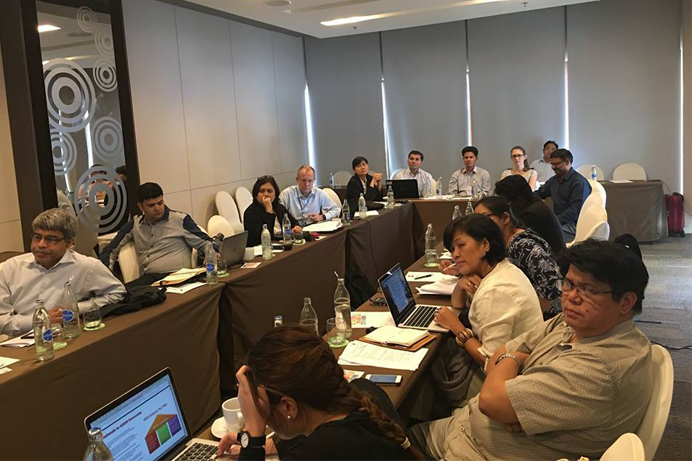
Bangkok, 24-25 February 2017: Over 30 participants of the regional workshop on CSO engagement on SDGs in particular HLPF-VNR jointly organized by the Asia Development Alliance (ADA) and Asia CSO Partnership for Sustainable Development (APSD). The workshop having discussed the global and regional processes of SDG implementation by the UN and CSOs, and assessed the CSO engagement with the government on SDG implementation in 11 countries such as Bangladesh, Cambodia, India, Indonesia, Japan, Malaysia, Nepal, Pakistan, Philippines, Singapore, Thailand, in particular the preparation for the Voluntary National Review (VNR) of the UN High-level Political Forum (HLPF).
Representative from Cambodia, Mr. Sun Youra representing The NGO Forum on Cambodia (NGOF) and Mr. Soeung Saroeun representing Cooperation Committee for Cambodia (CCC) has contributed the experiences of CSO engagement on SDGs in Cambodia, which is including the good practices, gaps, and the call to action and strategy to ensure the meaningful participation of CSOs in the preparation of HLPF-VNR and accountability mechanism in SDG implementation and motoring process at the national level.
The major findings about good practices of CSO engagements on SDG implementation at the national level in some countries, including:
• The SDGs provided the framework for various types of CSOs to come together in a national platform – human rights groups, social movements, development NGOs, research and think tank groups, INGOs, etc. In others, the CSOs even lead the formation of loose coalitions working on the SDGs to include business, government, academic and media organizations.
• CSOs are able to participate in the government’s national processes and committees on the SDGs, providing researches and improving government data.
• It is more strategic to influence the bureaucracy and local governments on the SDGs, if the national government is indifferent or antagonistic to CSOs.

In most countries and at various levels, we found the gaps of CSO engagements on SDG implement as below, but not limited to:
• Civic space is either limited and superficial or downright closed. The situations are most difficult for those working on human rights, justice and peace, and environmental issues.
• The governments’ SDG targets are not ambitious enough and prioritize only those which can be easily reached or where data is available.
• Availability of government data for the indicators are generally poor – there should be a way for CSO data and researches, even for thematic areas, to inform government data.
• The governments’ voluntary reports to UN are often sugarcoated. They should not replace national and local accountabilities.
• At the grassroots where the monitoring and review of the SDGs matter most, awareness and participation are very limited. SDG materials are mostly in English and too technical.
• CSO thought leaders are maturing – we need to bring younger advocates to sustain the campaign in the next 15 years.
Recommendations to the governments and UN
1. Ensure meaningful participation of CSOs in the preparation of HLPF-VNR
2. Human rights-based accountability mechanism in SDG implementation and monitoring process
3. Overcoming silos and fragmentation in UN and inter-governmental processes
4. No-selectivitty
5. Shrinking civic space and enabling environment
6. SDG 16 as cross-cutting issue,
7. Introduce the UN HRC’s UPR systems
Call to Action and Strategic guidelines
1. Inequality campaign
2. SDG 16 – independent monitoring report
3. Capacity-building of CSOs on policy engagement and monitoring
4. Develop independent indicators for independent CSO monitoring
5. Develop a practical guideline for CSO engagement on SDGs at the national level
6. Engage with the G20, ADB…
7. Engage with regional organizations such as ASEAN, SAARC, etc.
8. Bottom-up approach – engagement with local government
9. Principled engagement with other stake-holders and multi-stake holder partnership
10. Global citizenship education (Target 4.7)
11. Strengthen CSO regional mechanisms like APSD and links to regional processes so there are more time for country reviews
12. UN to have depository of CSO alternative reports and outcomes of CSO side events which should inform formal processes